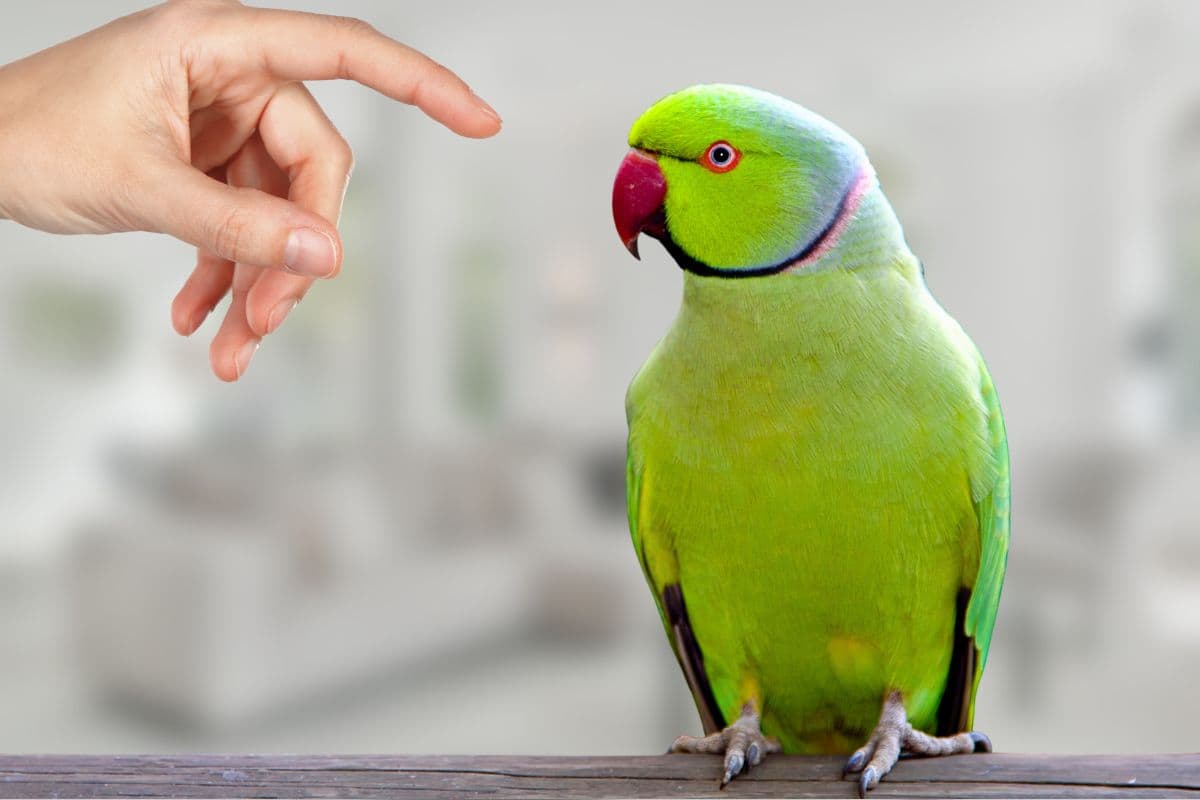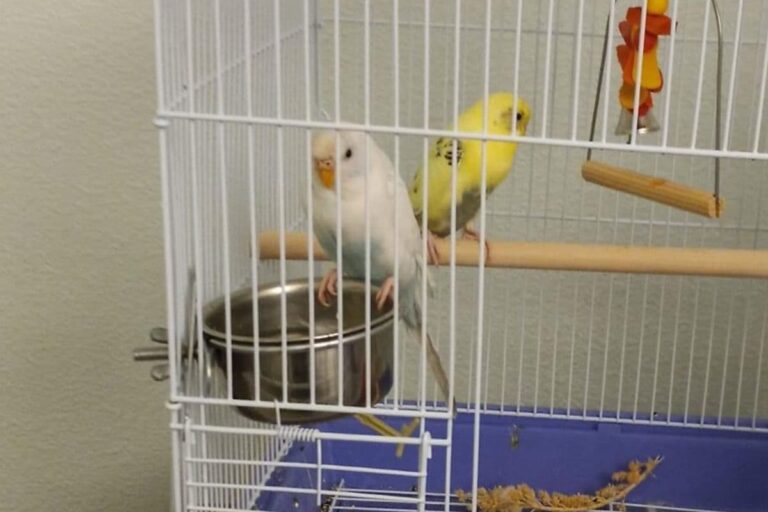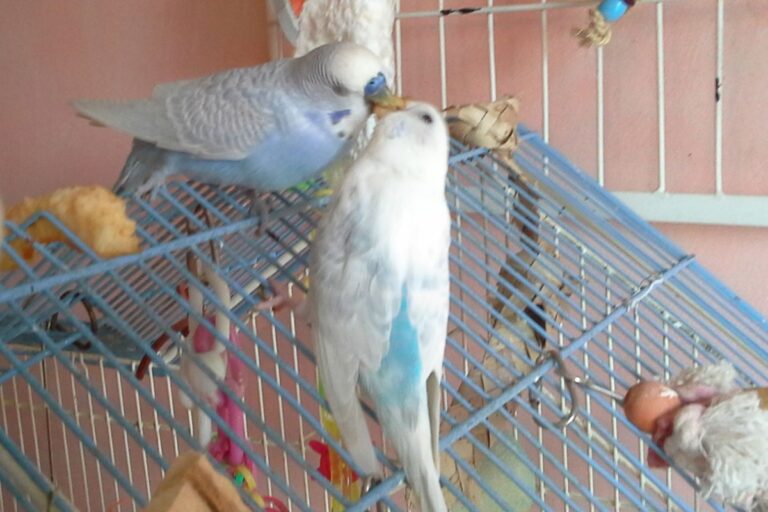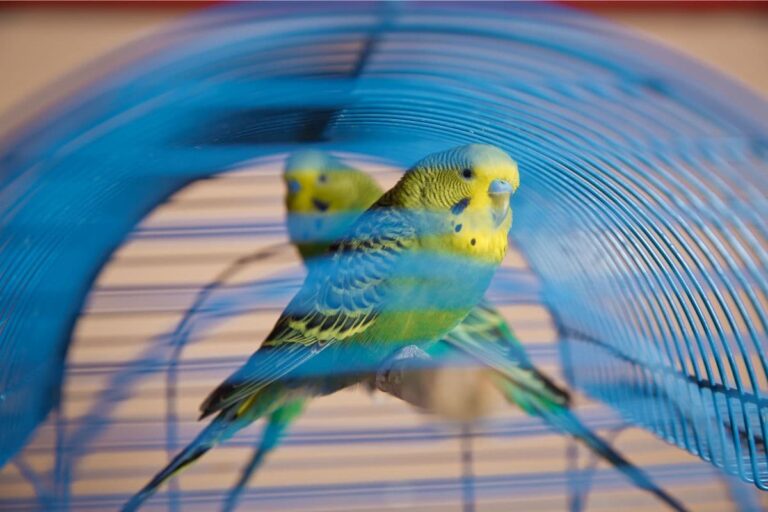Is My Parakeet Scared of Me – Causes & What to Do About It
Disclosure: The opinions expressed in this post are my own. This post may also contain affiliate links, which means that I will receive a commission if you decide to purchase through my links, at no additional cost to you. As an Amazon Associate, I earn from qualifying purchases.
If you’ve ever owned a parakeet, you know that they can be skittish little creatures. It’s not uncommon for birds to be wary of humans, especially if they haven’t been socialized properly. But how can you tell if your parakeet is scared of you or if it’s just their natural behavior?
In this article, we’ll explore some common signs that your parakeet may be scared of you and what you can do to build trust and strengthen your bond with your feathered friend. By understanding your parakeet’s behavior, you can create a safe and comfortable environment for them to thrive in.
Signs that My Parakeet is Scared of Me
Parakeets are naturally timid and shy creatures, so it is important to be aware of the signs that your parakeet may be scared of you. These physical and behavioral signs will help you identify if your parakeet is feeling scared or anxious in your presence.
- Getting away or hiding in the corners of its cage when you approach
- Refusing to take treats from you
- Having watery poops, also known as “fear poop”
- Not interested in playing with you
- Becoming agitated or distressed when you approach
- Making loud noises and flapping its wings when you are near
- Avoiding eye contact with you
Why is My Parakeet Scared of Me
Owning a parakeet can be a frustrating experience at times if your feathered friend appears to be scared of you. It’s important to understand why your parakeet might be scared and how you can build trust with them. Here are some common reasons why your parakeet may be scared of you.
1. Lack of Bond or Trust
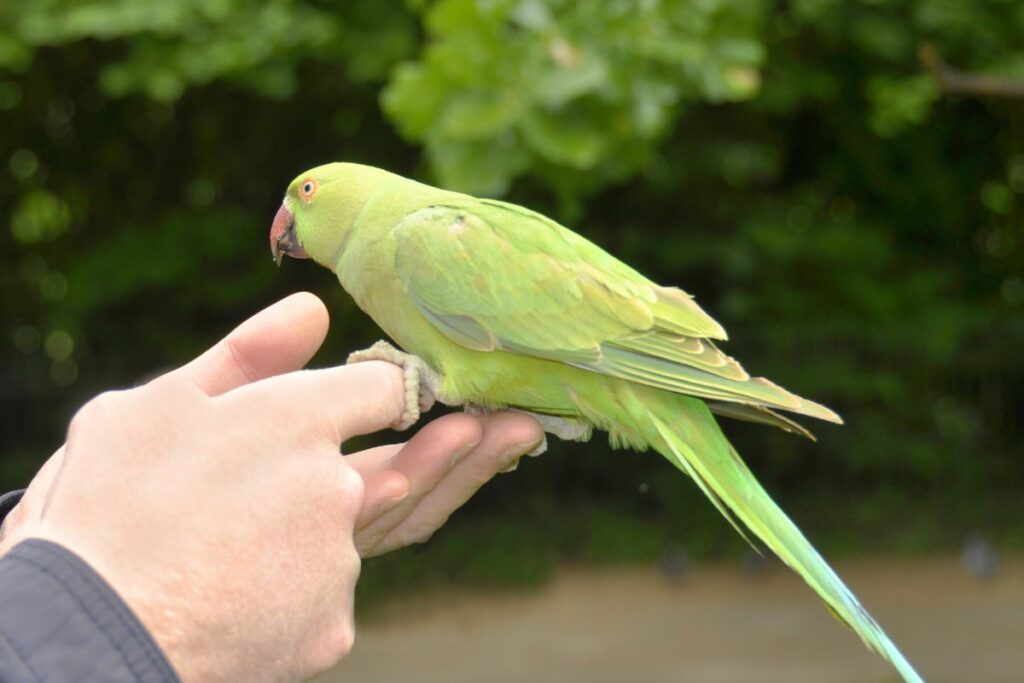
It’s not uncommon for a parakeet to be afraid of their owner at first. They’re generally very social creatures, but they can take some time to warm up to their human companion.
If your parakeet hasn’t been properly socialized or handled by people in the past, they may be hesitant to interact with you.
To build trust with your parakeet, start by spending time near its cage without trying to interact with it. Talk softly to your bird and offer it treats through the bars of the cage to show that you are a friend.
Once your bird seems comfortable with you being near its cage, you can start slowly introducing your hand into its space. Offer your hand with a treat on it and let your bird come to you on its own terms.
It’s important to never force your parakeet to interact with you or do anything it’s uncomfortable with. This can damage the trust you’ve built and make your bird even more scared of you.
Consistency is key when building trust with your parakeet. Spend time with it every day, offering treats and talking softly, and eventually your bird will come to see you as a trusted friend.
2. Overhandling
Too much handling at a time can be overwhelming and stressful for parakeets.
If your parakeet is exhibiting signs of fear or aggression when you try to handle them, it may be a sign that they need a break from interaction. Give them some space and time to adjust to their surroundings.
When you do handle your parakeet, make sure to do so gently and calmly. Avoid sudden movements or loud noises that could startle them. Start with short handling sessions and gradually increase the time as your parakeet becomes more comfortable.
It’s also important to respect your parakeet’s body language. If they are flapping their wings, squirming, or biting, it may be a sign that they want to be put down. Pay attention to their cues and adjust your handling accordingly.
To help your parakeet feel more comfortable around you, you can offer treats or toys as positive reinforcement. This will help them associate you with positive experiences and build trust over time. Remember, building a strong bond with your parakeet takes patience and consistency.
3. Abusive Previous Owner
If your parakeet was previously owned by someone who mistreated or abused them, it’s possible that they are scared of humans in general. Signs of abuse may include aggressive behavior, feather plucking, or a general fear of being handled.
To help your parakeet overcome their fear, it’s important to create a safe and non-threatening environment for them. Spend time sitting near their cage, talking softly to them, and offering them treats to help build trust, so that they can rebuild the trust with humans after coming from an abusive home.
If your parakeet is still exhibiting signs of fear or aggression, it may be necessary to seek the help of a professional bird trainer or behaviorist who can work with you and your bird to address any underlying issues.
4. Unfamiliar Environment or New Faces
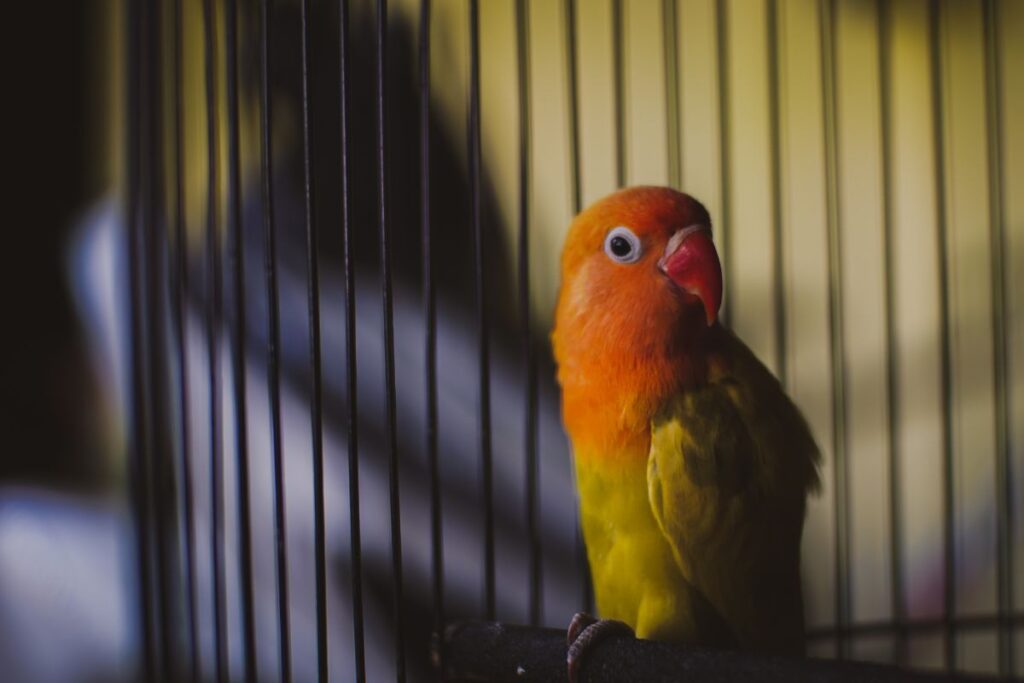
Parakeets can become scared in general if they are placed in an unfamiliar environment or introduced to new faces. This can cause them to become stressed and anxious, leading to fearful behavior. To help your parakeet overcome this fear, it’s important to introduce them slowly to new environments and people.
Start by placing your parakeet in a quiet room with minimal distractions and gradually introduce them to new sounds and sights. Allow them to explore their new environment at their own pace, and provide plenty of positive reinforcement and treats for good behavior.
When introducing your parakeet to new people, it’s important to do so slowly and calmly. Allow your parakeet to approach the new person on their own terms, and avoid forcing them to interact if they are not comfortable. With patience and positive reinforcement, your parakeet can learn to overcome their fear of unfamiliar environments and new faces.
5. Other Pets Around That May Be a Predator
If you have other pets in the house, such as cats or dogs, your parakeet may feel threatened and scared. These animals are natural predators and may view your bird as prey. It’s important to never leave your parakeet unsupervised around other pets and to make sure they are safely secured in their cage when you are not around.
If your parakeet seems particularly afraid of a certain pet, it may be best to keep them separated entirely. You can try to gradually introduce them while closely monitoring their behavior, but always prioritize your bird’s safety.
In some cases, even the presence of a predator can cause stress and anxiety for your parakeet. Consider creating a separate space for your bird where they can feel safe and secure, away from any potential threats.
6. Loud Noises & Sudden Movements
Parakeets are easily scared by loud noises and sudden movements. If you accidentally drop something or make a sudden movement around your bird, it may become startled and fly away. To avoid this, try to move slowly and calmly around your parakeet.
It’s also important to keep your parakeet’s environment as quiet as possible. Avoid playing loud music or making loud noises around your bird. If you have other pets in the house, make sure they are not bothering your parakeet and causing it to become scared.
If your parakeet does become scared, give it some time to calm down. Try to approach it slowly and calmly, and offer it some treats or toys to help it feel more comfortable around you. With patience and consistency, your parakeet can learn to trust you and become less scared over time.
7. Past Traumatic Event
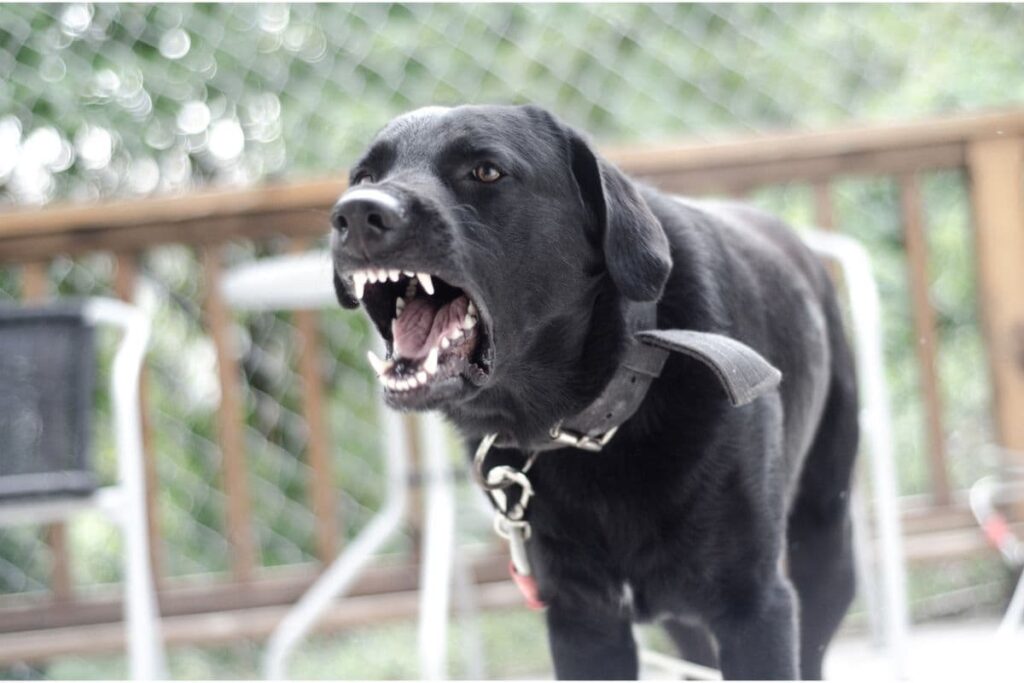
If your parakeet seems excessively scared of you, it’s possible that they have experienced a past traumatic event. This could include all the reasons mentioned above, such as being mishandled, attacked by a predator, or even just a loud noise that frightened them.
It’s important to be patient and understanding with your parakeet if they have experienced a traumatic event. They may need extra time and care to build trust with you and feel comfortable in their environment again. Consider seeking the help of a veterinarian or avian behavior specialist for guidance if whatever you are doing is not working.
What to Do If Your Parakeet is Scared of You
If your budgie always seems scared or nervous near you, there are some things you can do to try to help them feel more comfortable. Here are a few tips.
Gradual Socialization
Gradual socialization is a key method for helping your scared parakeet become more comfortable around you. Be sure to give them plenty of personal space as they adjust to their new environment. Start by sitting near their cage and talking to them in a soft, reassuring voice.
Over time, move closer to the cage and offer treats through the cage bars. Eventually, you can try opening the cage door and offering treats from your hand, while still allowing the bird to come to you on its own terms.
Handle Your Parakeet for Short Periods of Time
It’s important to handle your parakeet for short periods of time to help build trust. Start by gently placing your hand inside its cage and allowing it to approach you on its own terms.
Once it are comfortable with your hand being in their cage, you can slowly start to offer it treats from your hand and gradually work up to holding them it for short periods of time outside of its cage. Remember to always move slowly and speak in a soft, reassuring tone to help your parakeet feel safe and secure.
Creating a Safe Environment
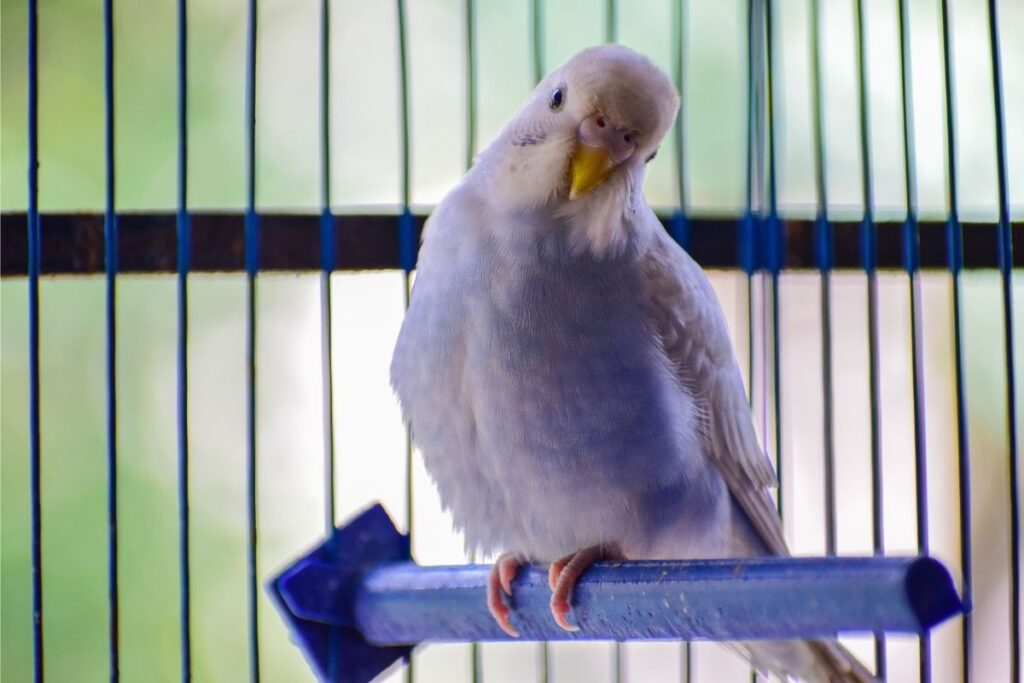
Creating a safe environment is crucial when it comes to helping your parakeet overcome fear. Start by assessing your bird’s living space and ensuring that it’s free of potential hazards.
Make sure that your parakeet has plenty of hiding spots and perches to feel secure. Consider adding natural elements like plants and toys to create a more comfortable and stimulating environment.
Speak Softly & Calmly
When trying to calm a scared parakeet, it’s important to speak softly and calmly. Loud noises or sudden movements can startle your bird and make them more frightened.
Approach your parakeet slowly and speak to them in a gentle tone. This will help them feel more comfortable and safe in your presence.
Positive Reinforcement
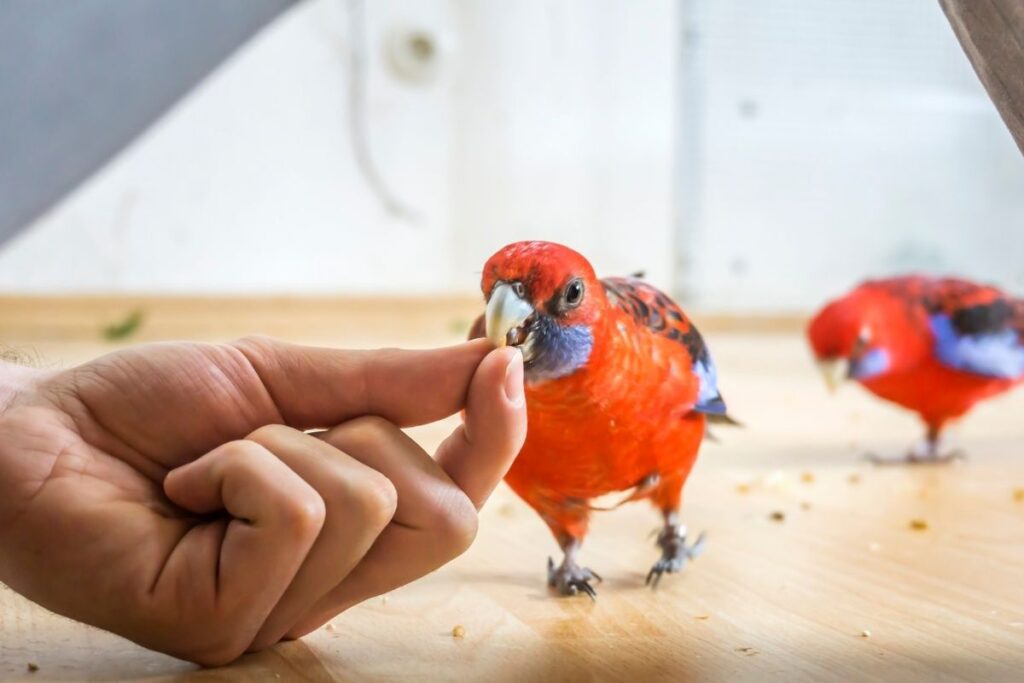
Positive reinforcement is a powerful tool when it comes to training your parakeet and building a trusting relationship with them. Whenever your bird does something you want them to do, like step onto your finger or eat from your hand, reward them with a treat or praise.
It’s important to remember that positive reinforcement should be used consistently and immediately after the desired behavior occurs, so your bird can make the connection between their action and the reward. Over time, your parakeet will begin to associate you with positive experiences, and their fear and anxiety will diminish.
Be Patient and Give Them Time to Adjust
When bringing a new parakeet home, it’s important to give them time to adjust to their new environment. This can be a stressful time for them, as they are in a new place with unfamiliar people and surroundings.
During the adjustment period, it’s best to avoid handling your parakeet too much. Instead, allow them to become comfortable with their surroundings and observe you from a distance. Gradually introduce yourself and build trust through positive interactions, such as offering treats and speaking softly to them.
Do Budgies Like to be Handled?
Budgies are naturally gentle, social birds that enjoy the company of their human caregivers. While some budgies may enjoy being held and cuddled, others may seem more resistant to handling. Fortunately, with a little patience and gentle persuasion, you should be able to win over even the shiest of budgies.
Most budgies enjoy being handled and will readily perch on their caregiver’s finger or shoulder. However, some budgies may be nervous or skittish, and may not want to be held right away. If your budgie is resistant to being handled, don’t force the issue. Instead, try gradually getting your budgie used to your presence by sitting near its cage and talking quietly to it.
Once your budgie seems comfortable with you being around, try offering it a treat from your hand. If your budgie takes the treat without hesitating, you can try gently petting it on the head or back. If your budgie still seems skittish, don’t worry–with time and patience, it should become more comfortable with being handled.
Final Words
If you’re concerned about your parakeet being scared of you, it’s important to take a step back and assess the situation. Try to identify the cause of their fear and work to address it in a gentle and patient manner.
Remember to always approach your parakeet slowly and calmly, and never force them to interact with you if they’re not comfortable. With time and effort, you can build a trusting and loving relationship with your feathered friend.



